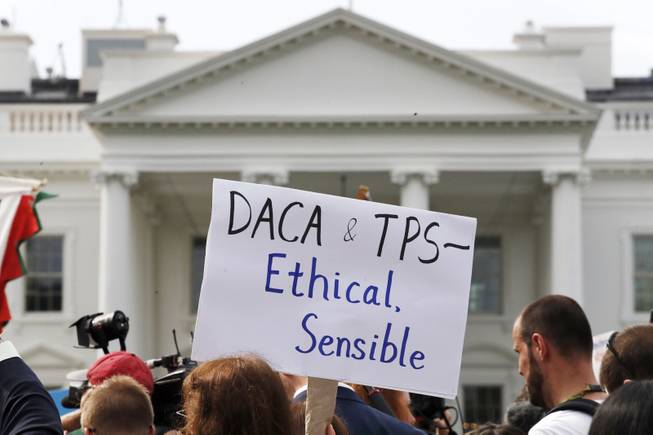
A person holds up a sign in support of the Deferred Action for Childhood Arrivals, known as DACA, and Temporary Protected Status programs during a rally in support of DACA and TPS outside of the White House, in Washington, Tuesday, Sept. 5, 2017. President Donald Trump’s administration will “wind down” a program protecting hundreds of thousands of young immigrants who were brought into the country illegally as children, Attorney General Jeff Sessions declared Tuesday, calling the Obama administration’s program “an unconstitutional exercise of authority.” (AP Photo/Jacquelyn Martin)
Tuesday, Jan. 16, 2018 | 2 a.m.
View more of the Sun's opinion section
To those who support Donald Trump’s decision to end Temporary Protected Status for Salvadorans living in the U.S., here’s a question.
How long should immigrants have to pay their dues in order to be fully accepted here and granted permanent residency?
Should it be five years? Ten? How about 24 years, which is the average amount of time that TPS recipients from El Salvador have been living in Nevada?
If not, then how long? Fifty years? A hundred?
Keep in mind, these immigrants must stay out of trouble with the law to maintain their protected status. They have to pay fees on a regular basis to renew their protections, too.
Like the U.S. citizens around them, they also pay a variety of taxes and contribute to Social Security. And make no mistake, the vast majority of them are employed.
“They're working here so that they can ensure that their kids have an opportunity to succeed, to put a roof over their heads, to make sure they can put food on the table and their kids can get an education,” Sen. Catherine Cortez Masto, D-Nev., said last week after meeting with a group of Salvadoran TPS recipients at the Culinary Union’s headquarters. “I ask you, is that any different than any of us? It's no different than my family."
So again, how long is long enough?
Let’s also not forget that these individuals are residents in our neighborhoods and members of our faith communities. In some cases, they’ve been here since their teens — longer than they lived in El Salvador. Others have had children of their own in the U.S. and face being separated from them unless Congress steps in and opposes Trump.
“I couldn't say it better than what I've heard here today: In their hearts, in their minds, in their soul, they are Americans,” Cortez Masto said.
So what does it take for an immigrant to prove that he or she is worthy of being here? Working hard, staying out of trouble, raising families, practicing their faith, contributing to their community — sounds like bedrock American values here.
For those citizens who are backing Trump on the issue, how many years should your immigrant forebears have had to prove themselves? With the exception of Native Americans or African-Americans whose family members were brought to the U.S. as slaves, that question applies to all of us here in this land of immigrants.
If 24 years sounds like an extreme answer to that question, then how can what’s happening today be fair?
“This administration has continued down the path of xenophobia and racism and tearing our families apart,” Cortez Masto said. “I'll call it out, because that's not what the president of the United States should be doing. The president should be uniting this country.”
Cortez Masto and other Democrats in the Nevada congressional delegation have said they would support legislation like the Safe Environment from Countries Under Repression and Emergency Act, which protects TPS and Deferred Action for Childhood Arrivals recipients.
Here’s wishing them good luck. The U.S. should welcome people who’ve proven themselves to be outstanding co-workers, neighbors and fellow church members, not show them the door.
